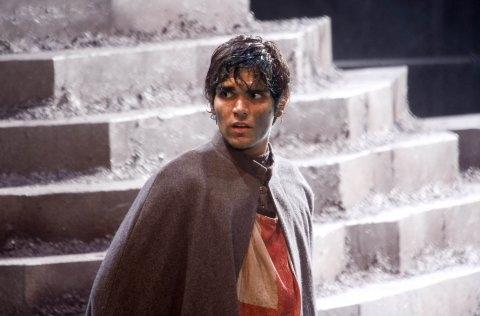Scottish playwright David Greig’s new play, for the Royal Shakespeare Company in their London season at Hampstead, picks up where Shakespeare’s Macbeth left off (almost). We are in 11th-century Dunsinane, the seat of power in Scotland. Macbeth (referred to here as simply “the tyrant”) is dead, his queen (Gruach) is very much alive, and Malcolm and Macduff are poised for power as the invading English army under Lord Siward attempts to install Malcolm as puppet king over a newly united Scotland. But really we could be in Whitehall discussing Iraq or Afghanistan as, historical drama aside, Greig’s play is an engaging, beautifully written parable on the morality of war.
The words “weapons of mass destruction”, “regime change” or “spin” may not appear in the script, but they are very much its subtext. Scottish playwright David Greig’s new play, for the Royal Shakespeare Company in their London season at Hampstead, picks up where Shakespeare’s Macbeth left off (almost). We are in 11th-century Dunsinane, the seat of power in Scotland. Macbeth (referred to here as simply “the tyrant”) is dead, his queen (Gruach) is very much alive, and Malcolm and Macduff are poised for power as the invading English army under Lord Siward attempts to install Malcolm as puppet king over a newly united Scotland. But really we could be in Whitehall discussing Iraq or Afghanistan as, historical drama aside, Greig’s play is an engaging, beautifully written parable on the morality of war. The words “weapons of mass destruction”, “regime change” or “spin” may not appear in the script, but they are very much its subtext.
Having installed Malcolm (Brian Ferguson), the honourable Siward (Jonny Phillips) thinks that peace will spontaneously break out, but is soon to learn that the “freed” Scots are not so easily united, and that the new king is an expert in convenient spin - although he calls it “clarification”. Siward and Malcolm’s exchanges are full of delightful wordplay between the tell-it-like-it-is soldier and the fey, venal but astute Malcolm, who could give Machiavelli a run for his money.
Siward has also to deal with an equally cunning Gruach (Siobhan Redmond), who had her first husband killed so she could wed Macbeth, and who still wields great power among some of Scotland’s clans. Her son, who has a claim on the throne, is on the run from the English and the seductive queen will do anything necessary to protect him, including taking Siward into her bed. He compares her regal mien to a falcon’s as they flirt. “Falcons are never tame,” Gruach replies. “They just choose their allegiances very carefully.”
All around Siward is mistrust and double-dealing, even among his own lieutenants - Alex Mann’s comically effete but greedy Egham, who purloins some of the queen’s silver, effectively makes the point that even the goodies can be baddies where the spoils of war are concerned. The modern parallels are perhaps a touch too heavily made in the first half-hour of Dunsinane, but Greig soon settles into telling a riveting tale in which Siward is driven to distraction by trying to do the right thing in a very wrong world.
Greig undercuts what could be dry historical drama with lots of comedy, much of it deeply black, and in Roxana Silbert’s otherwise sure-handed (if slightly overlong) production, the broader elements threaten to undermine the play’s more serious content. I must confess the sight of English soldiers rampaging through Dunsinane’s ramparts and describing their kills reminded me at times of Monty Python’s Crusaders.
The set, by Robert Innes Hopkins, is stepped, bleak slate with a grey Celtic cross and a couple of bare trees, and expertly conveys the inhospitable Scottish landscape - "rock, bog, forest and loch," as one character says - that the English repeatedly refer to in the rudest terms; it certainly makes for a good running gag. The soundscape, composed by Nick Powell and performed offstage by three musicians, is a mix of electro-rock and haunting Gaelic chant-song, and only occasionally does it punctuate the action too loudly.
There is much to enjoy here, in particular Greig’s playfulness with language and compelling performances from the main players; equally memorable is Sam Swann (who is still at drama school) as the Boy Soldier, who narrates part of the action in the guise of letters home to his mum in Kent. If the play has a weakness, it’s that there are so many egregiously nasty characters on stage that at times it’s difficult to engage one’s emotions, even when terrible things happen and we see Siward, a patently good man, defeated by events beyond his control. But Dunsinane is an intelligent play written with passion and wit, and as a parable for our times it works brilliantly.
Book for Dunsinance at Hampstead Theatre, London NW3 until 6 March















Add comment